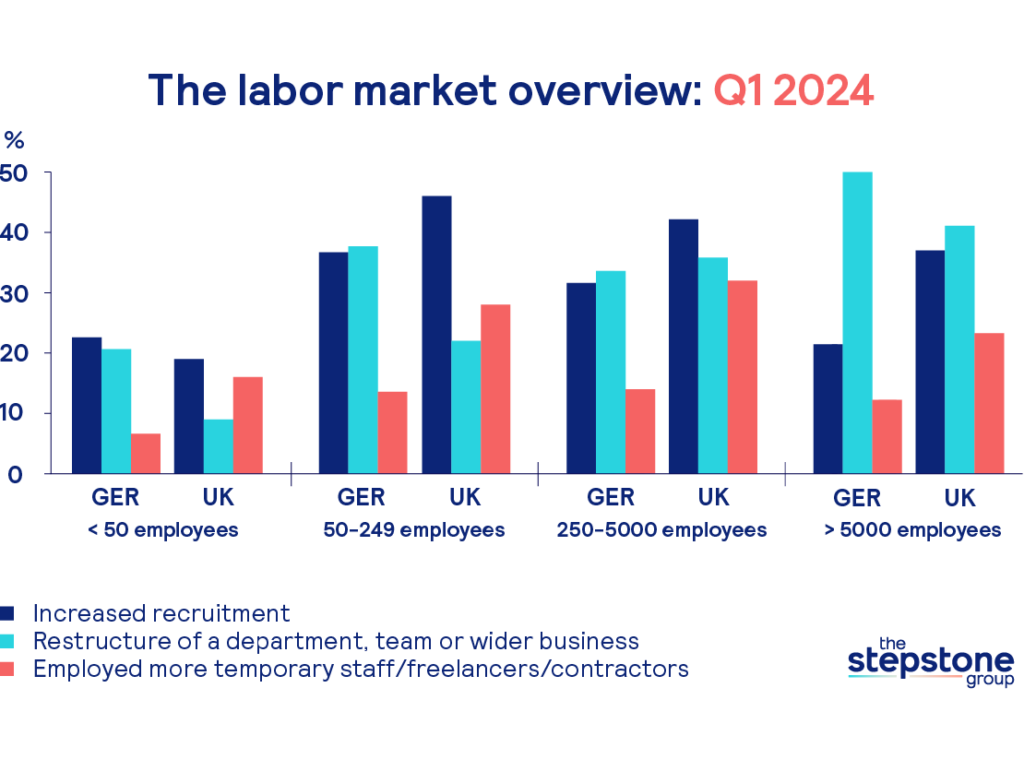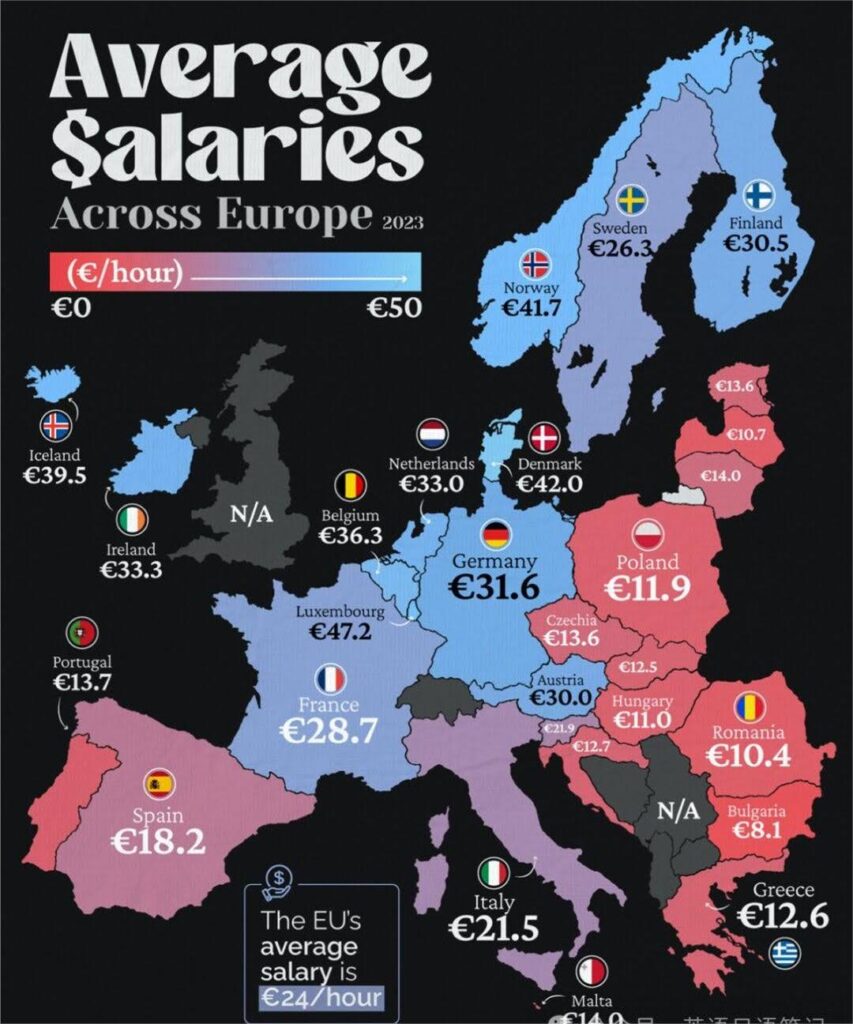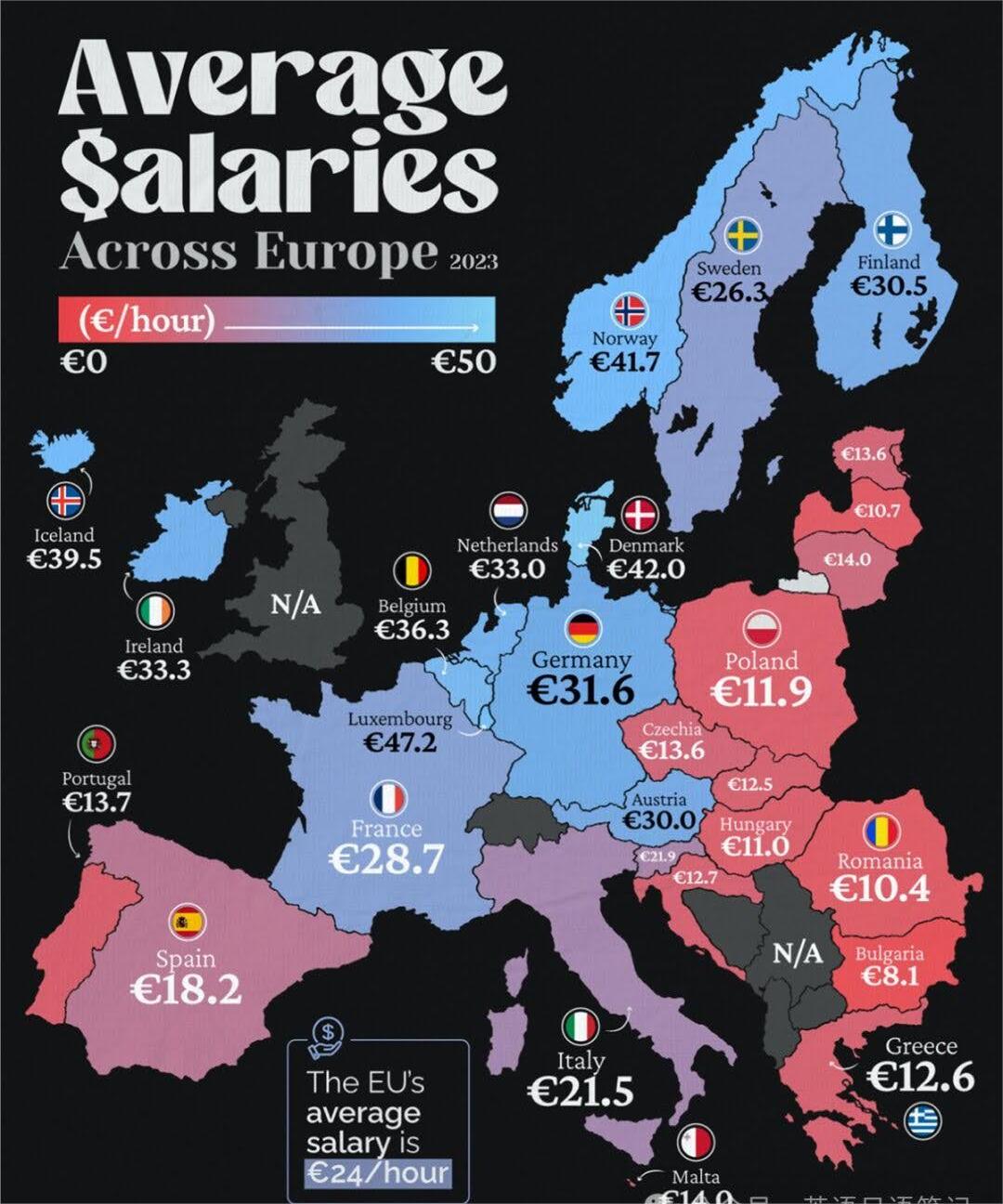In 2024, the Average German Salary is €50,250, dropped by 5.4% compared to the 2023(€53,118). This decline reflects shifts in various industries. Sectors like consulting and insurance offer higher compensation packages. However, these fields often have lower entry barriers and less intense competition.
Stepstone, a leading employment platform, recently released its annual Average German Salary Report. The report provides invaluable insights into the current landscape of wages in Germany. It sheds light on opportunities and challenges within the global job market.
Average German Salary
Stepstone’s 2024 German Salary Report analyzed data from 921,973 user profiles. The Average German Salary stands at €50,250. Comparatively, the previous year recorded an average total salary of €53,118. This decline underscores the economic fluctuations impacting the workforce in Germany.
The report also highlights the significant impact of education on earning potential. Individuals with a university degree enjoy a substantially higher median total Average German Salary. They earn around €57,500 compared to their non-degree-holding counterparts, who earn approximately €41,000. This translates to a remarkable 33% increase in income for degree holders, emphasizing the value of higher education in Germany.
In summary, while 2024 saw a decline in the average German salary, opportunities for career advancement and increased earning potential remain prevalent, especially for those with a solid educational foundation. As individuals navigate the evolving job market, leveraging professional expertise, seeking reputable sources of information, and continuously enhancing skills are pivotal in securing financial stability and success.
| Median annual salary | |
| Male | 45.750 € |
| Female | 40.000 € |
| Managers | 50.000 € |
| Academic | 57.500 € |
| Non-Academic | 41.000 € |
Top 10 Professions with the Highest Average German Salary
In Germany, physicians continue to rank among the highest earners. Their median total salary remains steady at €94,750, mirroring figures from the previous year. Other top-earning groups include employees in the banking, finance, and insurance sectors, with an annual salary totaling €57,000, as well as engineers, who earn a median annual Average German Salary of €56,000.
Conversely, the wholesale and retail trade, along with the hospitality sector, report the lowest incomes. Professions within healthcare, such as nursing, also fall below the national median salary, contributing to the persistent shortage of skilled nursing professionals in the country.
When considering career paths in Germany, these Average German Salary insights provide valuable guidance for individuals seeking lucrative opportunities and financial stability. As the job market evolves, understanding the earning potential across various industries can empower individuals to make informed decisions about their professional endeavors.
| Occupation/occupational | Median annual salary | Average annual salary |
| Doctors | 94.750 € | 107.250 € |
| Banking, finance and insurance | 57.000 € | 63.000 € |
| Engineer | 56.000 € | 60.250 € |
| Consulting | 54.000 € | 59.750 € |
| IT Industry | 54.000 € | 59.000 € |
| Marketing & PR | 50.000 € | 57.000 € |
| Human Resources | 45.500 € | 55.000 € |
| Sales | 43.000 € | 50.750 € |
| Handicrafts | 40.250 € | 43.500 € |
| Healthcare & Social Services | 39.000€ | 42.500 € |
| Logistics | 38.000 € | 43.750 € |
| Wholesale and Retail | 35.750 € | 40.250 € |
| Restaurants and hotels | 35.500 € | 39.750 € |
Salary Increases with Work Experience
When it comes to work experience, there’s an average Average German Salary gap of around €10,000. Employees with less than a year of experience earn an average income of €38,250. In contrast, those with 11 to 25 years of work experience have an average annual salary of €48,000. Typically, with each additional year of experience, you can expect a salary increase of €1,000. So, there’s hope for the future!
Top Industries with High Average German Salaries
The banking industry takes the lead as the highest-paying sector in Germany, with an average annual salary totaling €63,250. Following closely behind is the aerospace industry, boasting a median salary of €57,750. Another noteworthy sector is insurance, offering lucrative opportunities with relatively low entry barriers.
On the other hand, industries such as hospitality and food services (with an annual salary total of €35,000) and agriculture, forestry, fishing, and horticulture (with an annual Average German Salary total of €36,000) report the lowest median salaries.
Southern Boasts Highest Average German Salary
Even decades after the reunification of Germany, significant salary disparities persist between the eastern and western federal states. These variations also extend to the country’s major cities. Among these cities, the southern regions stand out for offering the highest annual salaries. Munich leads the pack with the highest median Average German Salary(pre-tax) of €56,250, followed closely by Stuttgart with a pre-tax median salary of €54,500. While Munich boasts high incomes, it also contends with high living costs, with rents soaring to €1,000, nearly one-third of many people’s monthly wages.
2023 Salary Satisfaction Trends
Only 4% of Germans express high satisfaction with their salaries, a significant decline from the previous year. Conversely, 32% feel moderately satisfied, indicating a general downward trend. Moreover, 47% expressed dissatisfaction with their salary over the past year, with 17% reporting extreme dissatisfaction, a 46% increase from the previous year. These figures underscore the deteriorating salary landscape in Germany over the past year.
Q1 2024 Recruitment Trends
The growth trend in the UK sharply contrasts with the potential stagnation in the German market, impacting labor market sentiment. Germany’s labor market exhibits sluggish growth, with minimal decreases in unemployment rates and modest increases in employment numbers. Overall employment rates in the UK surpass those in Germany, reflecting a more proactive stance in recovery. Compared to Germany (11%), UK businesses hire more temporary staff (27%), indicating greater flexibility in responding to market fluctuations.

Global Employment Market Rankings: Germany Leads Among Non-English Speaking Countries
This year’s international leader is Australia, surpassing the previous champions, the United States, and Canada, from the 2020 rankings. Germany relinquished its previous fourth-place ranking to the UK but remains the most popular non-English-speaking country.
- Australia↑
- United States↓
- Canada↓
- United Kingdom↑
- Germany↓
The willingness of German respondents to work abroad is notably low, with less than half expressing interest, and only fewer than 7% actively seeking employment outside Germany. Preferred destinations for German respondents include neighboring countries Switzerland and Austria, followed by the United States and Spain. Conversely, Germany is an attractive destination for individuals from Bosnia and Herzegovina (32%), Turkey (30%), Pakistan, and Hungary (each at 26%).
Research also indicates that specific job opportunities primarily determine employees’ willingness to work abroad, rather than associating particular countries with personal benefits. For nearly three-quarters of respondents (74%), job quality is the reason for choosing Germany, while factors like healthcare systems are only relevant to about one-third (34%).
Position of Average German Salary in Europe
The Average German salary holds a mid-level position in Europe at €31.6 per hour. This surpasses the overall European average hourly wage of €24 but falls below Norway, the Netherlands, Iceland, Ireland, Denmark, Luxembourg, and Belgium.

Conclusion
To secure high-paying jobs in Germany, emphasis should be placed on choosing a relevant major from the outset. According to Average German Salary reports, selecting a major with promising job prospects is crucial. For instance, STEM (Science, Technology, Engineering, and Mathematics) majors typically command higher starting salaries. Positions in the consulting and insurance industries rank moderately in terms of compensation but offer relatively low competition and entry barriers, making them worth considering.
Furthermore, starting internships and accumulating relevant work experience early on is crucial. This not only enhances your employability but also helps you better understand your career interests and development direction.
Finally, improving proficiency in German is paramount. While many German companies operate in English, enhancing your German language skills significantly increases your employment opportunities and may lead to a higher Average German Salary.
More Information
- References from Average Salary in Germany – WeAreDevelopers,
- Full Report in Q1 2024 Hiring Trends Index: Stepstone
- Click to learn about German 1.4116 Stainless Steel, The Perfect Material For Making Kitchen Knives
- Click to learn about: Get Ready for the Ultimate October Festival Germany [2024]
- More about Germans & Their Efficiency At Work | Germany In A Nutshell



